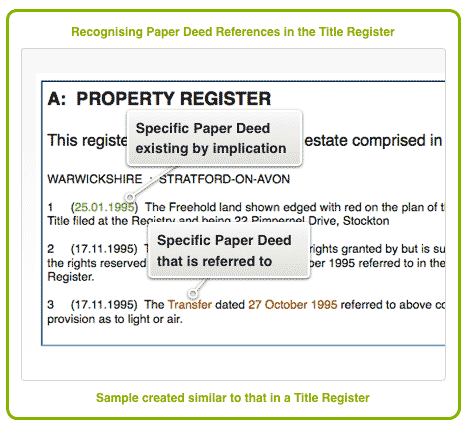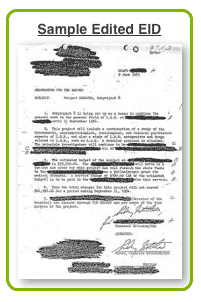Digitised Deeds
Where Deeds are kept by the Land Registry on their computers ("electronic" or "digitised" deeds), the Title Register reveals their presence by referring to the deed and then using words similar to "copy in certificate" or "copy filed" at the end of the paragraph referring to it. Such wording often varies depending on the circumstances. Such documents are always available for purchase, using our general Deed Search.
These Deeds have been scanned by the Land Registry and made available for purchase because they consider that the contents add to the property description and are important enough to retain. Many deeds do not add any further useful information to the property description and are not therefore retained.
One can therefore see the importance of carrying out this conveyancing search whenever one is dealing with unregistered property.
Sometimes the Land Registry copy onto the Title Register any useful information so that there is no need to retain the deed. This is less likely to happen where the amount of useful information in the Deed is voluminous, and thus these are the Deeds most likely to be digitised.
Associated Titles
For various reasons, some of the deeds affecting a property are kept on a separate Title. Where they are held on a separate title the main Title Register contains a statement to that effect, and provides the Title number. Such copy Deeds can then be purchased.

Paper Deeds
The Land Registry retain many deeds that have not been scanned into their electronic system but retain them as paper copies. These deeds will often be referred to in the Register, either directly or indirectly. A paper deed referred to directly will not contain a statement at the end of the paragraph stating that a copy has been filed.
Copies of such Deeds will be available.
An example of a deed referred to indirectly is where there is no reference to a purchase deed, but it can be seen from the Register that the property was purchased on a particular date and by a named person. In order to give legal effect to such a purchase (which must be evidenced by Deed) there must have been a Deed of Transfer or a Deed of Conveyance, and so its existence is known.
As its existence is known it may be possible to obtain a copy from the Land Registry, provided they have retained a copy.
Digital (Scanned) Deeds
This is a search for all Deeds scanned by the Land Registry relating to the Title in question, and is our basic Deeds search. In the Title Register for a property there are often references to Deeds, such as Conveyances, Transfers, Agreements, Declarations etc. The reference will usually provide the date of the Deed, state the parties to it and then provide brief details of the salient parts of the Deed.
If the reference to the Deed appears in the A section of the Register then it will be referring to rights benefiting the property, e.g. easements such as rights of way in the owner's favour, rights of light and rights of support. If the reference appears in the C section then it will be referring to encumbrances that burden the property, e.g. restrictive covenants, rights of way in favour of a neighbour, etc. Often a deed is referred to in both sections.

At the end of the paragraph describing the Deed there may be a statement similar to "copy filed". This means that the Land Registry have scanned a copy of the Deed and are now storing it on their computers. This in turn means that a copy of the Deed is available to the general public if they wish to purchase it.


This search provides a copy of ALL the Deeds that are referenced in such a manner for a specified Title. This may sometimes amount to scores of Deeds, sometimes only one or two. Every Title is unique and contains a different number of and different types of Deeds.
Sometimes the Land Registry will allocate a different Title number to some of the Deeds (an Associated Title). If they do so the Title Register will contain a reference to this effect and will provide the Title number. If copies of these Deeds are also required then a separate search fee is required, and it will be necessary to quote the Title number on the application form.
Specific Deed referred to in the Title Register but not held digitally (a Paper Deed)
The Land Registry hold many paper Deeds that have not been scanned and stored on their computers, but which are expressly or impliedly referred to by date within the Title Register. Such may still be available to the public and can be obtained by virtue of sections 66 and 67 of the Land Registration Act 2002. All correspondence relating thereto takes place by post and so the search may take a week or so longer.
A Deed referred to by implication may be one of the purchase Deeds.
The first date in brackets referred to in the A section of the Register is the date of first registration of the property, which would normally arise on the purchase of a property and so there must be a conveyance or transfer.
The first date in brackets in the B section of the Register is the date the current owner became registered following his purchase, so again there must be a conveyance or transfer.
In each of the above cases the type of deed and its date are known, which is sufficient information to place an order to obtain a copy of the Deed.
Another example of a Deed referred to by implication is where, in the B section of the Title Register, one of the subsequent paragraphs begins with a date in brackets and refers to a Restriction. That Restriction must be incorporated into a Deed from which the short particulars of the Restriction have been derived.
Sometimes the above documents are actually held on Land Registry computers, but where they are not, it may be assumed that the Deeds either do or did exist, and may therefore be available for purchase.
We include with this search a copy of the Title Register, as we have to obtain this to identify the relevant document.
Specific Paper Deed that is known to exist but that is not referred to in the Title Register
Deeds that are not referred to in the Title Register either directly or by implication, but that you know about, may still be obtained, e.g. there may be an agreement between a former purchaser and vendor in which personal covenants were given by the purchaser. As personal covenants do not "run with the land", i.e. they do not bind a subsequent purchaser, then there is no need for the Land Registry to refer to them in the current Title Register. If you know of the Deed creating them a copy of that Deed may be obtained.
We include with this search a copy of the Title Register, as we have to obtain this to identify the document you require.
Other Documents kept by the Land Registry relating to an Application to them
Examples of documents falling under this heading are:
- Application for a Restriction submitted to the Land Registry
- Counsel's Opinions or other such evidence in support of an application for an entry or cancellation of an entry on a Title Register
- Correspondence relating to an application
- An application not to display the purchase price of a property
We include with this search a copy of the Title Register, as we have to obtain this to identify the relevant document.
Edited Exempt Information Document
When an application is made to the Land Registry for a document to be classified as an Exempt Information Document (EID) it must be accompanied by a redacted copy that has the sensitive information blocked out. The edited EID is available to members of the public.
We include with this search a copy of the Title Register, which is necessary to help identify the relevant document.

Non-Edited Exempt Information Document (authorised persons only)
Where a document contains prejudicial information an application can be made by a person so affected to classify the document as an Exempt Information Document (EID). If the application is successful the document can only be obtained in its entirety in respect of criminal matters, receivership & insolvency, and Inland Revenue investigations.
Authorised persons are:
For criminal matters:
- A policeman authorised by his chief officer
- A director general of the security service
- A person authorised by the Secretary of State for Work and Pensions or the Department of Trade and Industry
- The Director of Public Prosecutions (DPP) or a member of the Crown Prosecution Service with the DPP's authority
- The Director of the Serious Fraud Squad
- The Director of the Assets Recovery Agency
- A person authorised by the Commissioners of HMRC
For receivership and insolvency matters:
- An Official Receiver, Liquidator or Administrator
- A Trustee in Bankruptcy
- A Receiver under the Drug Trafficking Act 1994 or the Proceeds of Crime Act 2008
- A person authorised by the Commissioners of HMRC
We include with this search a copy of the Title Register, as we have to obtain this to identify the relevant document.